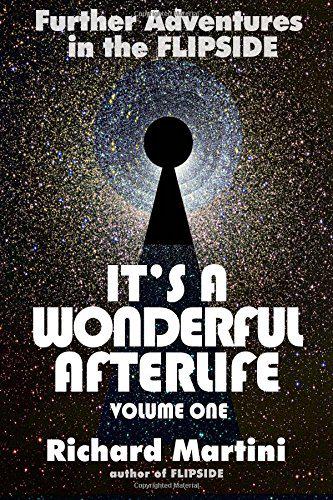Can consciousness exist outside the brain?
This is pretty much the crux of the question about the afterlife.
Great talk by Dr. Bruce Greyson on the topic can be found here:
There are scientists, reasonable people, very intelligent people, who don't believe it's the case. There are doctors, lawyers, educators, politicians, business people who don't believe this is the case. There are entire sociological structures who don't believe it's the casee. It's at the heart of whatever debate anyone wants to have about the afterlife.
And from my research into the topic, I can tell you that religious people don't really believe it either. Plenty of theories about the soul going somewhere - used to go to limbo, then when limbo was cancelled, Buddhists believe that there's a subtle clear light of consciousness that moves from one body to the next, but not that it's fully conscious - they describe it as a "wisp of smoke." There are a number of eastern religions who feel that our consciousness after leaving our body is pushed/pulled moved around to places based on our karma, or good or bad deeds. Certainly that's echoed in the Christian religions who believe that sin or the lack of it dictates where and how our consciousness moves around after we're gone.
And then we have the post materialist scientists, those dealing with quantum physics who believe that there may be a myriad of universes, options, that are occuring, all of them beyond our will, and that in the afterlife we find ourselves pulled in a myriad of directions, perhaps millions of lifetimes and choices, ad nauseum.
It's just not in the data.
What is in the data - or research - or anecdotes - I don't particularly care what one calls them, but they're eyewitness accounts, we find that not only are we conscious after this life, there are many accounts of being hyper aware, or conscious of other details, all of our lifetimes, conscious of libraries, and classrooms and teachers and schools and groups of individuals who guide and counsel and love us, and laugh at us too.
Basically that everything we've been told about the afterlife - that it's a place or retribution, it's a place of revenge, it's a place of suffering from our actions here on the planet, is not supported by the data. Or anecdotes.
I use the word anecdote because that's the latest attack by materialist scientists talking about near death experiences. "They're just anecdotes." Well, if you get 10,000 anecdotes, and they all relatively report the same events, do we ignore them? And then if you compare the 10,000 anecdotes to people who have had between life experiences, either via a coma, or while under deep hypnosis, or some other consciousness altering event, should we discount them when they all relatively say the same things about the afterlife? I call them "eyewitness accounts" because what else are they? If you get 10,000 people who witness the same event, you're going to get that many saying different things about it - but you're also going to find that most of them say the same things about it. Because that's the nature of language, of communication, of syntax and nomenclature. They express themselves in the best way they can.
Recently, I was given a transcript of a session that a person did while under deep hypnosis, where he was able to access some other entity that was not human in nature, not alien in nature either, but just some form of energetic thought that was beyond anything the person who had the experience had ever heard of or pondered before.
This person remembered a previous lifetime, the dates, life and journey of someone who lived in the 15th century, and during that lifetime had this apotheosis event where he/she felt connected to the earth. And the hypnotherapist asked this person to describe that event in greater detail. And further, the therapist asked the person to examine what that "connection to the earth" was about.
And in the session, this person claimed to be speaking to an entity - or energetic force if you will - that represented the planet itself. Mother Earth. Gaia. Whatever new age phrase you'd like to associate with this particular entity - that's been written about for eons, that many native cultures have claimed exists.
And in this fairly mind blowing encounter, this entity shared some wisdom - that every planet has their own version of an energetic "oversoul" that represents the planets (and stars I would imagine) and that they're all interconnected. That they all form some kind of network that is sentient. I've heard this before during some of the sessions I've filmed - that the "universe is sentient" but I didn't quite understand the concept. Perhaps this is a way of getting closer to that.
And this "mother earth" energy seemed slightly annoyed by the way humans had been treating their home. She/he likened it to "having the flu." She/he was describing the human a bit the way we would describe germs that have taken over our health, and how that would eventually "no longer be the case." This person couldn't access any apocalyptic version of events (for which I was grateful) but that things would "right themselves" in a way that it's supposed to. And that the consciousness of the planet is being raised, and those who can't handle that transformation will choose to incarnate on other planets where they'll fit in.
Which I thought was kind of funny. "You don't have to go home but you can't stay here." This person under deep hypnosis was claiming that those who can't handle the transformation of energy won't be coming back. It does give one pause. But it's just one person's observation, and if I get another dozen or so who say the same thing, I'll spend more time examining it. But until then, it's just another anecdote. Enjoy the weekend.
 |
| Look deep into my eyes... |
This is pretty much the crux of the question about the afterlife.
Great talk by Dr. Bruce Greyson on the topic can be found here:
There are scientists, reasonable people, very intelligent people, who don't believe it's the case. There are doctors, lawyers, educators, politicians, business people who don't believe this is the case. There are entire sociological structures who don't believe it's the casee. It's at the heart of whatever debate anyone wants to have about the afterlife.
And from my research into the topic, I can tell you that religious people don't really believe it either. Plenty of theories about the soul going somewhere - used to go to limbo, then when limbo was cancelled, Buddhists believe that there's a subtle clear light of consciousness that moves from one body to the next, but not that it's fully conscious - they describe it as a "wisp of smoke." There are a number of eastern religions who feel that our consciousness after leaving our body is pushed/pulled moved around to places based on our karma, or good or bad deeds. Certainly that's echoed in the Christian religions who believe that sin or the lack of it dictates where and how our consciousness moves around after we're gone.
 |
| Look deep into my eyes... |
And then we have the post materialist scientists, those dealing with quantum physics who believe that there may be a myriad of universes, options, that are occuring, all of them beyond our will, and that in the afterlife we find ourselves pulled in a myriad of directions, perhaps millions of lifetimes and choices, ad nauseum.
It's just not in the data.
What is in the data - or research - or anecdotes - I don't particularly care what one calls them, but they're eyewitness accounts, we find that not only are we conscious after this life, there are many accounts of being hyper aware, or conscious of other details, all of our lifetimes, conscious of libraries, and classrooms and teachers and schools and groups of individuals who guide and counsel and love us, and laugh at us too.
Basically that everything we've been told about the afterlife - that it's a place or retribution, it's a place of revenge, it's a place of suffering from our actions here on the planet, is not supported by the data. Or anecdotes.
 |
| Light reflecting on light |
I use the word anecdote because that's the latest attack by materialist scientists talking about near death experiences. "They're just anecdotes." Well, if you get 10,000 anecdotes, and they all relatively report the same events, do we ignore them? And then if you compare the 10,000 anecdotes to people who have had between life experiences, either via a coma, or while under deep hypnosis, or some other consciousness altering event, should we discount them when they all relatively say the same things about the afterlife? I call them "eyewitness accounts" because what else are they? If you get 10,000 people who witness the same event, you're going to get that many saying different things about it - but you're also going to find that most of them say the same things about it. Because that's the nature of language, of communication, of syntax and nomenclature. They express themselves in the best way they can.
Recently, I was given a transcript of a session that a person did while under deep hypnosis, where he was able to access some other entity that was not human in nature, not alien in nature either, but just some form of energetic thought that was beyond anything the person who had the experience had ever heard of or pondered before.
This person remembered a previous lifetime, the dates, life and journey of someone who lived in the 15th century, and during that lifetime had this apotheosis event where he/she felt connected to the earth. And the hypnotherapist asked this person to describe that event in greater detail. And further, the therapist asked the person to examine what that "connection to the earth" was about.
And in the session, this person claimed to be speaking to an entity - or energetic force if you will - that represented the planet itself. Mother Earth. Gaia. Whatever new age phrase you'd like to associate with this particular entity - that's been written about for eons, that many native cultures have claimed exists.
 |
| The pale blue dot has its own soul? Who knew? |
And in this fairly mind blowing encounter, this entity shared some wisdom - that every planet has their own version of an energetic "oversoul" that represents the planets (and stars I would imagine) and that they're all interconnected. That they all form some kind of network that is sentient. I've heard this before during some of the sessions I've filmed - that the "universe is sentient" but I didn't quite understand the concept. Perhaps this is a way of getting closer to that.
And this "mother earth" energy seemed slightly annoyed by the way humans had been treating their home. She/he likened it to "having the flu." She/he was describing the human a bit the way we would describe germs that have taken over our health, and how that would eventually "no longer be the case." This person couldn't access any apocalyptic version of events (for which I was grateful) but that things would "right themselves" in a way that it's supposed to. And that the consciousness of the planet is being raised, and those who can't handle that transformation will choose to incarnate on other planets where they'll fit in.
Which I thought was kind of funny. "You don't have to go home but you can't stay here." This person under deep hypnosis was claiming that those who can't handle the transformation of energy won't be coming back. It does give one pause. But it's just one person's observation, and if I get another dozen or so who say the same thing, I'll spend more time examining it. But until then, it's just another anecdote. Enjoy the weekend.


















